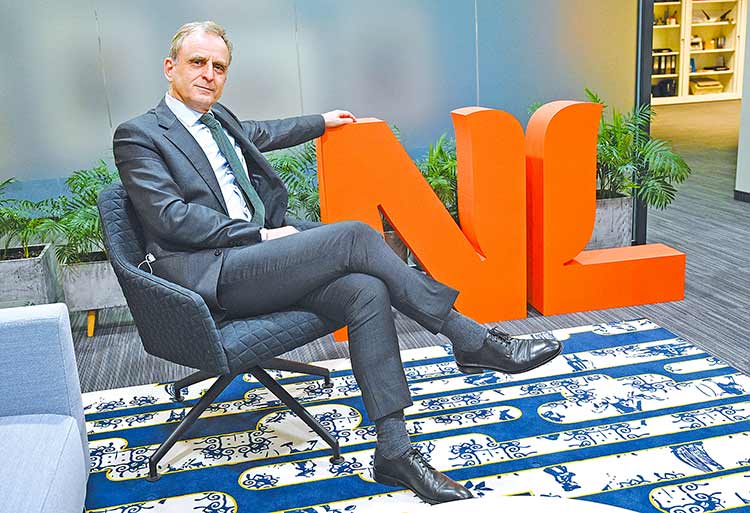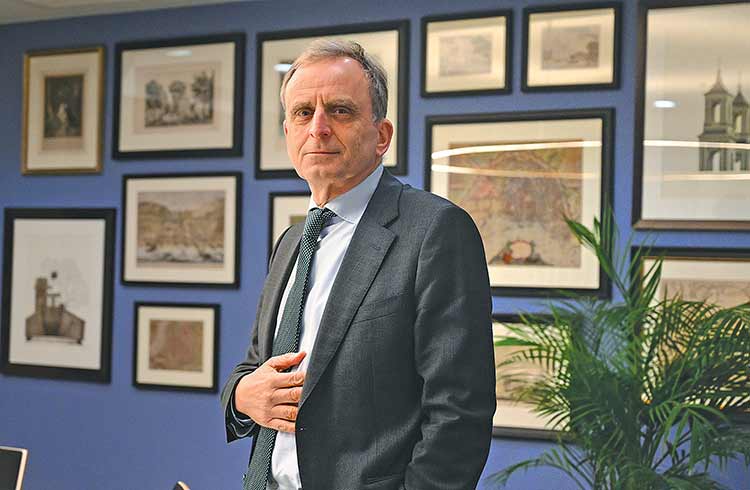Dutch ambassador Joost Reintjes speaks about the intensifying of bilateral cooperation between Serbia and the Netherlands with great enthusiasm. As he points out in this CorD Magazine interview: “in 2020, almost a third of all foreign direct investment in Serbia came from the Netherlands”.
And the ambassador believes that this trend may continue in many areas – from agriculture, wastewater management, port infrastructure, medical equipment and urban greening to IT. Viewed from the perspective of the Netherlands, he says that a “clear trackrecord in rule of law reforms” represents a prerequisite for economic progress, but also an accelerated route to EU membership.
Dutch ambassador Joost Reintjes speaks about the intensifying of bilateral cooperation between Serbia and the Netherlands with great enthusiasm. As he points out in this CorD Magazine interview: “in 2020, almost a third of all foreign direct investment in Serbia came from the Netherlands”. And the ambassador believes that this trend may continue in many areas – from agriculture, wastewater management, port infrastructure, medical equipment and urban greening to IT. Viewed from the perspective of the Netherlands, he says that a “clear track-record in rule of law reforms” represents a prerequisite for economic progress, but also an accelerated route to EU membership.
Your Excellency, you said after the presenting of your letter of credence upon arrival in Belgrade that quite some room exists to intensify political dialogue and to work on many forms of cooperation between Serbia and the Netherlands. As the end of your first six months in Serbia approaches, could you tell us about the directions in which cooperation between our two countries could develop?
Serbia and the Netherlands have a broad relationship, diplomatically, politically and economically. And we work continuously to broaden that relationship. On the political front, we have seen increased engagement with ministerial and high-level visits and political consultations, including the visit of foreign minister Selaković to the Netherlands in late November. I recently had meetings with Prime Minister Brnabić, as well as with quite a few other ministers. I’m sure that these discussions will continue during the next year, because they are important to understanding each other’s points of view and further intensifying our bilateral cooperation.
Another cornerstone of our engagement in Serbia is the promotion of the rule of law, a core value of the European Union. This is why we fund several projects through our MATRA fund, like the recent Detention and Alternative Sanctions training. These programmes also strengthen our bilateral ties, as we have trained hundreds of alumni throughout the years and are still in touch with many of them.
Our economic ties are also strong: there are numerous Dutch companies here, employing more than 17,000 people in a variety of sectors in Serbia. These companies and their products include household names that almost every Serbian knows and uses, such as Ahold-Delhaize, Philips, Heineken, KLM and Unilever. Our bilateral trade has been growing steadily, at an average of around 20 per cent annually, and we will hopefully hit the milestone of a billion euros soon.
In the eyes of investors, Serbia can be, and is showing itself to be, a reliable, stable and promising destination for business. This is because of the quality of labour, geographical location and increasing infrastructure connectivity
To assist in the green transformation of urban areas in Serbia, the Dutch public and private sectors have joined forces and established the Green Cities Serbia partnership, a consortium of experienced Dutch companies that offer sustainable and innovative solutions for greener, liveable, sustainable and beautiful cities. We have close cooperation with the City of Belgrade and also plan to partner with Niš and Novi Sad.
Lastly, with Dušan Tadić – just like with Velibor Vasović 50 years ago, a highly respected captain of Dutch champion Ajax Amsterdam – we have another example of excellent Serbian- Dutch cooperation. I was happy to meet him in Belgrade during the summer.
During your talks with officials in Serbia, you’ve heard expressions of hope that large multinational companies based in the Netherlands will perceive Serbia’s excellent investment climate and opt to do business in our country. Does such interest exist in the Netherlands?
In the eyes of investors, Serbia can be, and is showing itself to be, a reliable, stable and promising destination for business. This is because of the quality of labour, geographical location and increasing infrastructure connectivity. If we zoom in on the Netherlands, in 2020 almost a third of all foreign direct investment in Serbia came from the Netherlands. Now is the time to ensure that a clear track-record on rule of law reforms and increased transparency amplify that impression further still. The potential to increase our cooperation is huge and ranges from agriculture, wastewater management, port infrastructure, medical equipment and urban greening to IT. The Embassy helps identify business opportunities for Dutch companies and advise on potential risks. The Dutch-Serbian Business Association is a testament to this mutual interest and I’m very proud that the Dutch business community has been growing.

You stated during a recent discussion at the Ministry of Energy that interest in investing in the energy sector exists among some Dutch companies. Could you tell us which projects are attracting the greatest attention among Dutch investors?
Dutch companies have been orientating themselves towards opportunities in the renewable sector, including wind and solar energy generation, waste to energy projects, as well as engineering and project management. We have world-class engineers and innovators in the power generation sector.
You studied mining engineering. As such, could you respond to the current dilemma in Serbia over whether mining and environmental protection be combined?
I understand that it is a topic of debate. The environment is important to all of us. Although I don’t consider myself an expert in this field at all, I believe there are ways to combine mining and environmental protection through a robust regulatory baseline and legal system. People around the world are becoming increasingly aware – and protective – of the environment. It is important that, when moving forward on plans like new mining projects, all voices are heard and that there is enough support for the decisions taken.
We believe that the Netherlands benefits from a strong European Union with strong member states. That’s why it is important that candidate countries strengthen the resilience of their institutions, economies and democratic processes during the accession process
This issue is particularly important in Serbia, given that there are also great ambitions in the domain of agriculture. You recently noted Serbia’s potential in the production of berries and offered the expert services of Dutch institutes.
Agriculture is part of the DNA of the Netherlands, we are the world’s second largest exporter of agriculture produce, just behind the U.S. This is due to excellent knowledge infrastructure that ensures close cooperation between scientific institutions, the government and the private sector; the so-called “golden triangle”.
As an agricultural country, we clearly see opportunities in Serbia. Its climate, fertile soil and skilful farmers are an excellent match for Dutch innovative solutions, like new berry varieties that don’t bruise easily when handled, covered production and a more sustainable approach to production. It is a promising sector and the Embassy plans to organise various conferences, training courses and visits of Dutch experts to Serbia in order to support the work of Dutch and Serbian businesses.
Serbia hasn’t made progress on its EU accession path for two years, in terms of opening new negotiating clusters. Given the Dutch stance that “there are no shortcuts to membership”, what do you see as the key reason for this deadlock?
For the Netherlands, the accession process is merit-based and is determined individually for each country, based on the country’s reform progress. It is therefore important to underline that, for quite some time, no negotiating chapters were opened with Serbia because of limited to no progress in crucial reform areas, in particular relating to the rule of law. In that respect, my government recognises the renewed engagement and various steps taken by Serbia during the last year, as identified in the latest progress report. At the same time, the Dutch government considers that more can be done, in particular in the fight against corruption and organised crime, and in relation to media freedom. However, the fact that there are no shortcuts does not mean that the process cannot be accelerated – quite the contrary. According to the revised methodology, progress made regarding the so-called fundamentals determines the overall pace of the accession process even more than before, as well as the possible opening of new negotiating clusters.

You’ve no doubt had an opportunity to hear the stance that Serbia’s progress towards EU accession is essentially dependent on one condition: its position regarding Kosovo. Many believe that accepting its unilaterally declared independence would be a shortcut on the road to membership. Do you think that they are correct?
Although the normalisation of relations with Priština is definitely very important, it is not the one and only benchmark, in the sense that it is a shortcut to EU membership. The Netherlands believes that the revised methodology provides all the necessary steps for the EU accession process
On the other hand, you come from a country that doesn’t have much enthusiasm when it comes to the issue of EU enlargement. How do you convince citizens that EU membership for countries like Serbia can be a “winwin” option, as you wrote recently?
I don’t agree with your assessment. The Netherlands supports Serbia’s EU perspective and is engaged throughout the region. We believe that the Netherlands benefits from a strong European Union with strong member states. That’s why it is important that candidate countries strengthen the resilience of their institutions, economies and democratic processes during the accession process. We have been cooperating actively with institutions and civil society organisations for years to help reach that goal through various bilateral programmes, such as MATRA and the Multi Donor Trust Fund for Justice Sector Support.
Being part of the EU also means you adhere to the values and norms of the Union and that you need to align your foreign policy with the Common Foreign and Security Policy of the European Union
Serbia will hold regular presidential and early parliamentary elections in a few months. Do you think that conditions for fair elections have been achieved through the interparty dialogue that has been co-facilitated by MEPs?
There are several instruments that can contribute to improved election conditions, such as the different interparty dialogue working documents and the ODIHR recommendations, if implemented. The effect of these on the quality of the electoral process can only be comprehensively assessed after the elections have taken place.
Your previous diplomatic experience was related to the Middle East and Africa. However, it could be said that you arrived in Serbia via Moscow, where you spent a year at the embassy of the Kingdom of the Netherlands. Are you already familiar with the thesis that cooperation between Russia and Serbia could allegedly hamper Serbia’s European integration process?
It is an argument that surfaces regularly, but one that I don’t fully subscribe to. The EU integration process does not mean that (future) member states cannot cooperate with the Russian Federation. The Netherlands also has bilateral relations with Russia. However, being part of the EU also means you adhere to the values and norms of the Union and that you need to align your foreign policy with the Common Foreign and Security Policy of the European Union.
| TRADE EXCHANGE Our bilateral trade has been growing steadily, at an average of around 20 per cent annually, and we will hopefully hit the milestone of a billion euros soon | EU ACCESSION The Netherlands believes that the revised methodology provides all the necessary steps for the EU accession process | OPPORTUNITIES As an agricultural country, we clearly see opportunities in Serbia. Its climate, fertile soil and skilful farmers are an excellent match for Dutch innovative solutions |
|---|